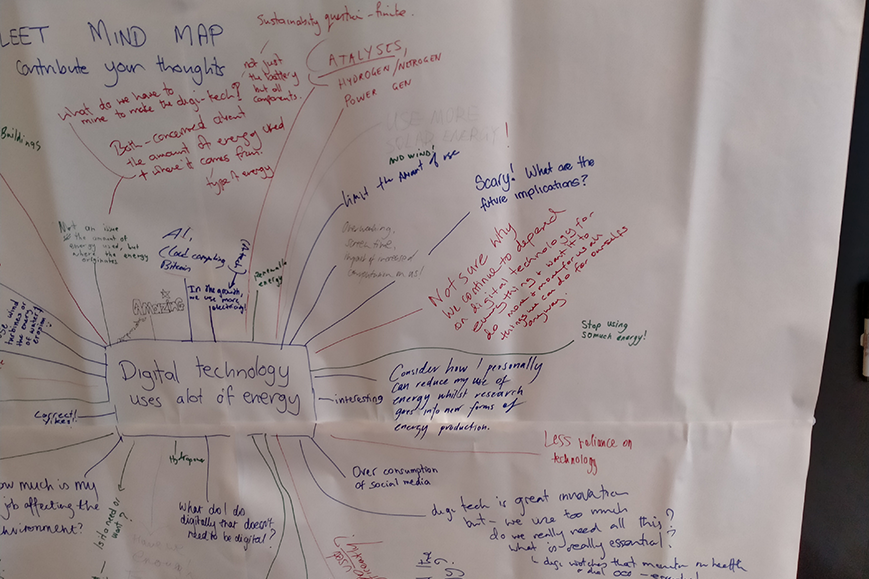
FLEET’s mission in outreach was to do more than just tell people about the science. Public engagement is an opportunity to have a critical dialogue with the public.
A key strategic goal for FLEET across all our audiences was for them to think critically about FLEET’s research and the implications of the energy consumption of digital technologies. But how did we know if we achieved this and our other goals?
We used recognised social science research methods to measure FLEET’s outreach impact and, critically, our evaluation shows that we have had a positive impact relevant to our strategic goals.
Measuring the impact of FLEET’s outreach events has been a crucial component of understanding FLEET’s research impact.
Each outreach event was designed to enable effective evaluation. This involved a mixed method approach based on varied pre- and post-evaluation activities. Pre- and post-responses were compared and thematically analysed to determine whether we had met our objectives.
“If the public, which includes school students, are to have agency and be empowered to make informed decisions about acceptable ways to solve societal problems, then we need to do more than just tell people about the science,” says FLEET Senior Outreach Coordinator Dr Jason Major.
“Public engagement is an opportunity to have a conversation with the public about FLEET’s research, its potential value, and the research problem we are trying to solve.
This dialogue can help spark peoples’ process of thinking critically about the particular problem (for example, the unsustainable energy consumption of computing), which better facilitates their ability to participate in solutions.”
Integrating evaluation
Evaluation was integrated into each outreach event in ways that avoided detracting from the students’ or public’s experience.
Pre- and post-activity questioning allowed us to establish the effectiveness of FLEET’s primary-school energy workshop, which was run for 300 Year 3–6 students at various schools in Australia and NZ.
Before beginning the activity, each group of students was prompted to brainstorm the question ‘what comes to mind when you think of energy?’ establishing a baseline of the students’ understanding and awareness of issues.
Students then built, modified and tested mini-catapults from icy pole sticks and rubber bands. This fun (usually quite chaotic) engineering exercise engaged students’ hands and brains, while encouraging students to assess their catapult designs encouraged discussion of kinetic and potential energy.
Post-activity brainstorm sessions sought student responses to the same question explored in the pre-activity brainstorm, allowing FLEET to assess the impact of the workshops.
Analysis revealed that students had indeed shifted from relatively simple ideas of energy towards deeper conceptualisations of what energy is, how humans use and value energy, and – importantly – the implications of its use.
This confirmed we had prompted students’ critical thinking about FLEET’s research, and about the Centre’s key research challenge of unsustainable ICT energy consumption.
Large public events such as the Sydney Science Trail Expo (approx. 4000 attendees each year) or Melbourne Knowledge Week (up to 500 people) similarly allowed FLEET an opportunity to actively engage the public with FLEET’s key research challenge.
Pre- and post-discussion surveying, confirmed we had effected a shift in public understanding about how society uses digital technology, with many people calling for a more-socially responsible digital future.
- Visitor experience of FLEET exhibits was overwhelmingly positive, visitors learned about physics and how it is applied to solve real-world problems.
- Visitors gained an awareness and appreciation for the purpose and value of FLEET’s research.
- Visitors thought critically about FLEET’s research and research problem.
- All visitors desired a sustainable and socially responsible digital future.
Also see FLEET outreach impact reports.
"The body of data we have built up confirmed that FLEET had a positive impact on student literacy and critical thinking about FLEET research. This is certainly gratifying to realise! But also insightful for me, as I realised how unaware students and the public are of the rise of energy consumption of digital technologies, and the implications this has for society. I feel even more strongly now that what we are doing has significant importance, and it is nice to know we have evidence to support that we are making a difference."
Dr Jason Major, FLEET Senior outreach coordinator







